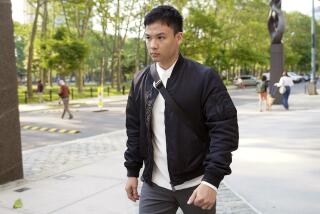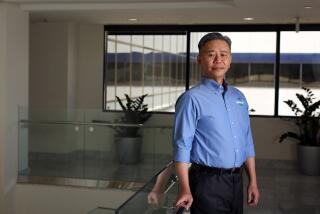Activist’s Trial Is Imminent in China, U.S. Says
- Share via
WASHINGTON — China is preparing to put activist Harry Wu on trial within the next day or two in what appears to be a carefully timed effort to clear up his case and set him free before the International Conference on Women opens in Beijing, according to senior Clinton Administration officials.
Wu, the Chinese American who has crusaded against China’s use of prison labor, will be tried in the Yangtze River city of Wuhan, apparently for offenses less than the espionage with which he has been charged. He was first detained in June after he tried to enter China at a remote border crossing from Kazakhstan.
If Wu is set free, China’s action would probably clear the way for First Lady Hillary Rodham Clinton to travel to Beijing for the international women’s conference, which begins next week. Republican leaders, human rights groups and Wu’s wife have all urged Mrs. Clinton to refrain from traveling to China while Wu is still in jail.
Wu’s release also would represent a step by China toward improving relations with the United States. It would come on the eve of a new fence-mending mission to China by a senior Administration official, Undersecretary of State Peter Tarnoff, who is scheduled to arrive in Beijing for talks this weekend.
“They will most likely put him on trial and convict him of something--from what we hear, short of espionage,” White House spokesman Mike McCurry acknowledged Tuesday. “Then the issue will be, what do they [Chinese authorities] propose, then, to do about it?”
*
Administration officials said they have no guarantee that Wu will be set free, or sent out of China, after his trial is completed. But they appeared to believe that he may be released.
There is no indication that Wu’s trial or release is part of an explicit deal with the United States. Rather, it appears to be a gesture China is making to remove an irritant in its relationship with America.
Earlier this month, after talks between Secretary of State Warren Christopher and Chinese Foreign Minister Qian Qichen in Brunei, U.S. officials said they had been told that Wu’s case was in the hands of judicial authorities, who China maintains are independent of the Communist Party leadership.
Although State Department officials did not make it public at the time, Christopher and his aides were told that Wu’s case would have to be completed by judicial authorities in the Wuhan Intermediate Court before there could be a “positive result.” That was a hint that China might be prepared to try Wu and then free him.
Wu’s trial in Wuhan, which could start today, will be closed, although a diplomat from the U.S. Embassy in Beijing will be permitted to attend, sources say. The State Department is said to have asked for Wu’s trial to be open but to have been turned down by Chinese authorities. There was no indication how long the trial will last.
Some of the charges against Wu stem from his role in helping Western television networks, including CBS and the British Broadcasting Corp., to get footage of abuses in Chinese prisons and labor camps. One “60 Minutes” show--on Chinese exports of goods made with prison labor--included film that Wu obtained through a hidden camera on a previous trip to China.
*
Last month, Chinese authorities sold to Western television outlets a videotape in which Wu, while in custody, appeared to confess that part of a program broadcast by the BBC was inaccurate.
McCurry admitted Tuesday that Mrs. Clinton’s proposed trip to China and Wu’s release “are now linked one way or another, even though there are strong arguments not to make that linkage.”
Mrs. Clinton has been eager to travel to Beijing to take part in the U.N.-sponsored women’s conference. The American delegation to the conference will be headed by Madeleine Albright, the U.S. ambassador to the United Nations.
The visit by the First Lady is one of a number of gestures that have been under consideration in Washington and Beijing to help smooth over recent frictions.
China was infuriated last spring when President Clinton, under pressure from Congress, granted a visa to Taiwanese President Lee Teng-hui to make an unprecedented trip to the United States for an alumni reunion at Cornell University in Upstate New York. China, which considers Taiwan part of its own territory, countered by recalling its ambassador to Washington and by conducting a series of missile tests and other military exercises in and near the Taiwan Strait.
Administration officials also have suggested the possibility of a meeting between Clinton and Chinese President Jiang Zemin in Washington this fall. Christopher said that such a meeting would be difficult, however, while Wu is still in Chinese custody.
Some conservative organizations and human rights groups have argued, for different reasons, that even if Wu is released, Mrs. Clinton should not go to the women’s conference in Beijing.
Conservatives have complained that the Beijing conference might advance what they consider a feminist agenda on women’s issues and that Mrs. Clinton’s participation might help give greater legitimacy to these positions.
Meanwhile, human rights groups and their supporters have argued that China’s overall human rights record is poor.
“Given . . . the recent roundup of Chinese dissidents, Mrs. Clinton’s presence at the conference would send the wrong message to China’s leaders,” Rep. Nancy Pelosi (D-San Francisco) said in a recent statement.
More to Read
Sign up for Essential California
The most important California stories and recommendations in your inbox every morning.
You may occasionally receive promotional content from the Los Angeles Times.













